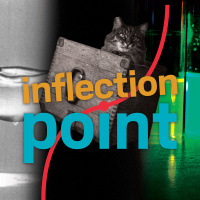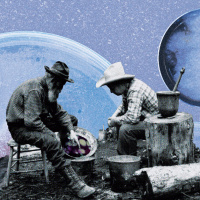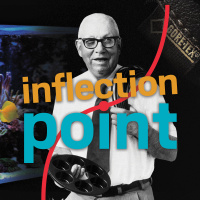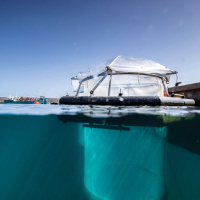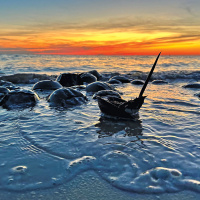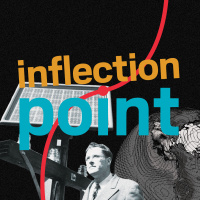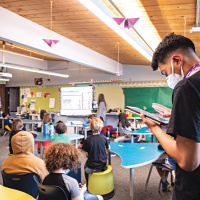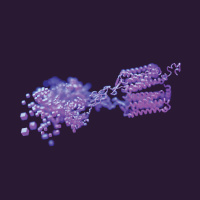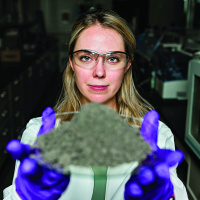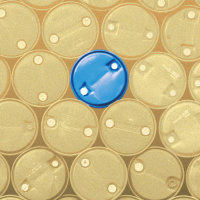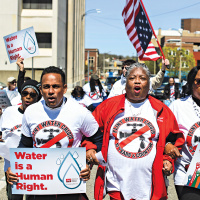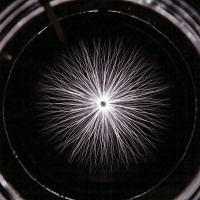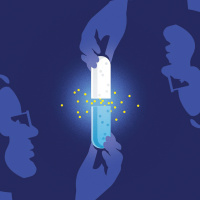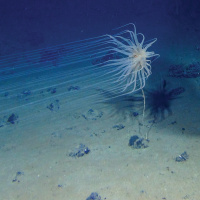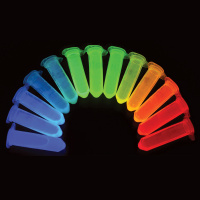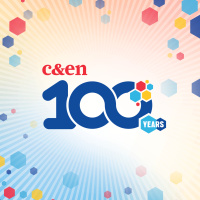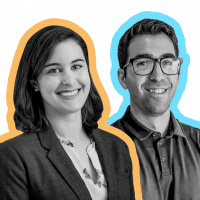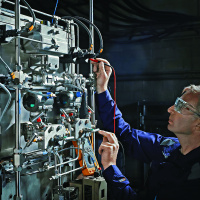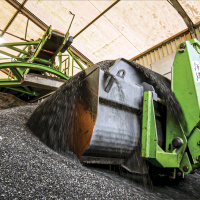Sinopsis
Stereo Chemistry is chemistry news told by the people making it. C&EN is the news magazine of the American Chemical Society.
Episodios
-
Inflection Point: The mind-bending innovations that built quantum computing
13/08/2025 Duración: 28minHosts David Anderson and Gina Vitale travel back in time to relive three historical moments that were meaningful to the development of quantum computers. They also bring in C&EN reporter Mitch Jacoby to discuss scientific advances enabled by quantum chemistry. C&EN’s Inflection Point leans on our 100-year archive to trace headline topics in science today back to their disparate and surprising roots. In each episode, we explore three lesser-known moments in science history that ultimately led us to current-day breakthroughs. With help from expert C&EN reporters, this new show examines how discoveries from our past have shaped our present and will change our future. Subscribe to Inflection Point now on Apple Podcasts, Spotify, or wherever you get your podcasts.
-
C&EN Uncovered: Will Emerging Technology Lead Us Into A New Antibiotic Golden Age?
30/07/2025 Duración: 28minAre we on the cusp of a new era of Biochemical discovery? In this episode of C&EN Uncovered, host Craig Bettenhausen speaks with C&EN reporter Max Barnhart about his recent C&EN cover story on the frontiers of bioprospecting for new antibiotics. Uncovered offers a deeper look at subjects from recent stories pulled from the pages of Chemical & Engineering News. Check out Max’s story on the recent advancements of Bioprospecting. Subscribe to Stereo Chemistry now on Apple Podcasts, Spotify, or wherever you listen to podcasts. Credits Executive producer: David Anderson Host: Craig Bettenhausen Reporter: Max Barnhart Video + Audio Producer: Jeremy Barr Episode artwork: Madeline Monroe Music: Commercial Flow, Shutterstock Contact Stereo Chemistry: Contact us on social media at @cenmag or email cenfeedback@acs.org.
-
Bonus Episode: 'Inflection Point' traces the serendipitous origins of PFAS
16/07/2025 Duración: 25minInflection Point leans on C&EN’s 100-year archive to trace headline topics in science today back to their disparate and surprising roots. In each episode, we explore three lesser-known moments in science history that ultimately led us to current-day breakthroughs. With help from expert C&EN reporters, this new show examines how discoveries from our past have shaped our present and will change our future. In our second episode, hosts David Anderson and Gina Vitale travel back in time to relive three events that ultimately led to the proliferation of PFAS. They also bring in C&EN reporter Britt Erickson to analyze how these ‘forever chemicals’ could shape our future. Subscribe to Inflection Point now on Apple Podcasts, Spotify, or wherever you get your podcasts.
-
C&EN Uncovered: Can altering ocean chemistry fight climate change?
19/06/2025 Duración: 21minCan climate catastrophe be stymied by tweaking seawater chemistry? In this episode of C&EN Uncovered, host Craig Bettenhausen speaks with C&EN reporter Fionna Samuels about her recent C&EN cover story concerning Ocean Alkalinity Enhancement (OAE) as a method to combat climate change by increasing ocean alkalinity to absorb more CO2. Uncovered offers a deeper look at subjects from recent stories pulled from the pages of Chemical & Engineering News. Check out Fionna’s story on engineering our oceans to mitigate the effects of Climate Change. Subscribe to Stereo Chemistry now on Apple Podcasts, Spotify, or wherever you listen to podcasts. Credits Executive Producer: David Anderson Host: Craig Bettenhausen Reporter: Fionna Samuels Video + Audio Producer: Jeremy Barr Episode artwork: Michael Sswat Music: Commercial Flow, Shutterstock Contact Stereo Chemistry: Contact us on social media at @cenmag or email cenfeedback@acs.org.
-
C&EN Uncovered: Turning tides for endotoxin testing
31/03/2025 Duración: 20minThe drug industry may finally phase out using horseshoe crab blood. What took so long? In this episode of C&EN Uncovered, host Craig Bettenhausen speaks with C&EN assistant editor Laurel Oldach about the use of horseshoe crab blood in pharmaceutical endotoxin testing, the challenges of transitioning to synthetic alternatives, and the regulatory hurdles involved. Stereo Chemistry offers a deeper look at subjects from recent stories pulled from the pages of Chemical & Engineering News. Check out Laurel’s story on the fight over horseshoe crab blood at https://cen.acs.org/safety/drug-safety/Turning-tides-endotoxin-testing/102/i34. Subscribe to Stereo Chemistry now on Apple Podcasts, Spotify, or wherever you listen to podcasts.
-
Bonus episode: Introducing Inflection Point
25/03/2025 Duración: 23minThe new podcast Inflection Point leans on C&EN’s 100-year archive to trace headline topics in science today back to their disparate and surprising roots. In each episode, we explore three lesser-known moments in science history that ultimately led us to current-day breakthroughs. With help from expert C&EN reporters, this new show examines how discoveries from our past have shaped our present and will change our future. In our first episode, hosts David Anderson and Gina Vitale travel back in time to relive three events that ultimately led to the development of green hydrogen. They also bring in C&EN reporter Craig Bettenhausen to analyze how this emerging technology could shape our future. Subscribe to Inflection Point now on Apple Podcasts, Spotify, or wherever you get your podcasts. A transcript of this episode can be found here.
-
C&EN Uncovered: Indoor air monitoring goes to school
27/11/2024 Duración: 19minThe COVID-19 pandemic put the importance of indoor air quality in stark relief. The air in schools was of particular concern, and that concern spurred collaboration between researchers and school staff to find interventions to improve air quality to safeguard the health of students and staff. Data from indoor air monitors revealed that filter-based portable air cleaners were effective at removing airborne particulates. Ongoing research and monitoring will determine whether this effort is making a beneficial health impact and will be used to decide how to manage indoor air quality going forward. C&EN Uncovered, a project from C&EN’s podcast, Stereo Chemistry, offers a deeper look at subjects from recent stories. Check out the full story about air quality monitoring in schools at cenm.ag/airqualityinschools. Cover photo: Undergraduate student Ricardo Reyes collects air quality measurements from the back of a classroom in Colorado. Subscribe to Stereo Chemistry now on Apple Podcasts, Spotify, or whe
-
Stereo Chemistry: How the Nobel Prize in Chemistry was won
29/10/2024 Duración: 27minOn Oct. 9, the 2024 Nobel Prize for Chemistry was awarded to David Baker, Demis Hassabis, and John M. Jumper for their work in prediction and design of protein structures. C&EN’s executive editor for life sciences, Laura Howes, joins a special episode of Stereo Chemistry to discuss why the trio won, the significance of their work around proteins, and how she accurately predicted the win in C&EN’s annual “Who Will Win?” webinar. Stereo Chemistry offers a deeper look at subjects from recent stories pulled from the pages of Chemical & Engineering News. Check out Laura’s story on how these computational chemists won this year’s Nobel Prize in Chemistry at cenm.ag/chemnobel2024.
-
C&EN Uncovered: PhD to CEO, how chemistry entrepreneurs are making the jump
30/09/2024 Duración: 22minIn the 20th century, corporate powerhouses like Bell Labs and DuPont Central Research funded R&D from their balance sheets, creating a clear path for postdoctoral scientists to innovate beyond their university research. In 2024, with the decay of corporate laboratories, graduates are taking the commercial start-up route more and more. C&EN, business reporter Matt Blois discusses several such start-ups, exploring how the founders are making the transition from PhD to CEO and mapping the various routes they've taken to secure funding to continue their research. C&EN Uncovered, a project from C&EN’s podcast, Stereo Chemistry, offers a deeper look at subjects from recent stories. Check out Matt’s story on how PhDs are learning to become CEOs at cenm.ag/chementrepreneurs Cover photo: Laura Stoy inside a laboratory at Rivalia Chemical Subscribe to Stereo Chemistry now on Apple Podcasts, Spotify, or wherever you listen to podcasts. A transcript of this episode is available at cen.acs.org. Credits E
-
C&EN Uncovered: Solvent Waste Levels, EPA Regulations, and Disposal
30/08/2024 Duración: 20minOn average, from 2011 to 2021, academic labs generated around 4,300 metric tons of hazardous waste each year. One of the largest lab-used solvents discarded is dichloromethane and more than half of that waste ends up burned. In today’s episode, policy reporters Krystal Vasquez and Leigh Krietsch Boerner dive into the processes academic labs use to dispose of said waste, the consequences of new EPA regulations around dichloromethane, and what solutions academic institutions are coming up with to accommodate these new rules. C&EN Uncovered, a project from C&EN’s podcast, Stereo Chemistry, offers a deeper look at subjects from recent stories. Check out Krystal’s story on the new U.S. Environmental Protection Agency regulations regarding dichloromethane at https://cenm.ag/dcmregs and check out Leigh’s story about solvent waste disposal in academic laboratories at https://cenm.ag/wastedisposal. Cover photo: Lab solvents C&EN July 15th cover photo Subscribe to Stereo Chemistry now on Apple Podcasts, Spo
-
C&EN Uncovered: Ongoing tragedies in Flint and East Palestine
19/07/2024 Duración: 18minTragedies in the communities of Flint, Michigan, and East Palestine, Ohio, continue to affect residents 10 years and 1 year on, respectively, from the initial events. Residents of both cities continue to rebound and rebuild despite ongoing issues revolving around the toxic chemicals that were introduced to their towns through human decisions. C&EN physical sciences reporter Priyanka Runwal traveled to both Flint and East Palestine to speak with residents about how they are recovering, how the actions of their representatives have fallen short, and their hopes to return to something of a “normal” existence in the future. C&EN Uncovered, a project from C&EN’s podcast, Stereo Chemistry, offers a deeper look at subjects from recent stories. Check out Priyanka’s cover story on Flint after 10 years at cenm.ag/flint; Check out Priyanka’s cover story on East Palestine at cenm.ag/eastpalestine Cover photo: Residents of Flint, Michigan, march arm in arm as they demand justice and accountability for their
-
Can ‘forever chemicals’ be destroyed?
17/05/2024 Duración: 19minPer- and polyfluoroalkyl substances, a class of chemicals known as PFAS, are often called “forever chemicals” because of how long they persist in the environment. They are prevalent in drinking water and have been linked to negative health outcomes. A slew of cleantech start-ups are cropping up with the aim of breaking down and destroying PFAS molecules. In this episode of C&EN Uncovered, reporter Britt Erickson explores the technologies behind these companies and the competition among them. C&EN Uncovered, a project from C&EN’s podcast, Stereo Chemistry, offers a deeper look at subjects from recent stories. Check out Britt’s cover story on the destruction techniques for these “forever chemicals” at cenm.ag/foreverchemicals. Cover photo: Argon gas plasma, which can break down PFAS, on the surface of liquid water Subscribe to Stereo Chemistry now on Apple Podcasts, Spotify, or wherever you listen to podcasts. A transcript of this episode will be available soon at cen.acs.org. Credits Executive
-
The small-molecule drug renaissance
09/02/2024 Duración: 19minAs the science of drug discovery has grown in scale and gotten more complicated, so have the drug molecules themselves. But there’s a promising class of drugs made of just a handful of atoms that punch above their weight by leveraging the natural chemistry of the cell. Recent discoveries have opened up a new era of pharmaceutical chemistry that some people are calling a golden age. In this episode of C&EN Uncovered, reporter Laura Howes explains this exciting field of research and its implications for the drugs of the future. C&EN Uncovered, a project from C&EN’s podcast, Stereo Chemistry, offers a deeper look at subjects from recent stories. Check out Laura’s cover story on small-molecule drugs at cenm.ag/smallmol. Subscribe to Stereo Chemistry now on Apple Podcasts, Spotify, or wherever you listen to podcasts. A transcript of this episode will be available soon at cen.acs.org. Credits Executive producer: Gina Vitale C&EN Uncovered host: Craig Bettenhausen Reporter: Laura Howes Audio editor:
-
C&EN Uncovered: The ocean floor is littered with valuable minerals. Should we go get them?
11/12/2023 Duración: 15minResting on the bottom of the ocean are potato-sized nodules of valuable minerals that are more or less up for grabs. Multiple corporations and some nations are racing to build deep-sea drones that can withstand the extreme conditions at the seafloor and bring these 1-20 cm nodules to eager buyers on the surface. Many of the metals in these nodules are critical for green technologies like batteries. But these nodules are also an important part of ecosystems we are just beginning to understand. In this episode, C&EN reporter Priyanka Runwal chats with host Craig Bettenhausen about this complex issue. C&EN Uncovered, a project from C&EN’s podcast, Stereo Chemistry, offers a deeper look at subjects from recent stories. Check out Runwal’s full story at cenm.ag/seafloormine. For more about mining the oceans, check out this episode of Stereo Chemistry from earlier this year about filtering minerals directly out of the water: cenm.ag/ocean Subscribe to Stereo Chemistry now on Apple Podcasts, Spo
-
C&EN Uncovered: The race to report on the Nobel Prizes
31/10/2023 Duración: 19minThe Nobel Prize announcements are big events at Chemical & Engineering News. But we find out the winners at the same time as everyone else. Then, the race is on for our reporters. This year, staffers Laurel Oldach and Mitch Jacoby took on the task of covering the science prizes. In this episode, they reflect on this year’s winning research in chemistry and medicine and share what it’s like covering the most prestigious prizes in science. C&EN Uncovered, a project from C&EN’s podcast, Stereo Chemistry, offers a deeper look at subjects from recent stories. Check out our reporting on the 2023 Nobel Prizes at https://cen.acs.org/magazine/101/10133.html. Subscribe to Stereo Chemistry now on Apple Podcasts, Spotify, or wherever you listen to podcasts. A transcript of this episode is available at cenm.ag/nobelpod23 Credits Executive producer: Gina Vitale Host: Gina Vitale Reporters: Mitch Jacoby and Laura Oldach Audio editor: Brian Gutierrez Copyeditor: Bran Vickers Story editor: Chris Gors
-
C&EN Uncovered: Looking back on 100 years of chemistry
29/09/2023 Duración: 13minThe first issue of C&EN was published in 1923 with the stated purpose of “the promotion of research, the development of the chemical industry, and the welfare of the chemist.” The world of chemistry has grown a lot since then, and the magazine has been there to report on it all. To celebrate our 100th anniversary, C&EN reporter and informal historian Alex Tullo has sifted through thousands of issues of the magazine, and in this episode, he guides our host Craig Bettenhausen on a tour through the magazine’s history from the industrialization of plastics, to the environmental movement, to the modern era of digital publication. When this episode was recorded, Tullo was preparing the From the Archives feature for the 1980s, which is now published. C&EN Uncovered, a project from C&EN’s podcast, Stereo Chemistry, offers a deeper look at subjects from recent stories. Read Alex’s entire series about the C&EN archives at cenm.ag/fromthearchives. A transcript of this episode will be available soon
-
Jennifer DiStefano and Jared Mondschein on the transition from the bench to the policy office
13/09/2023 Duración: 25minEarly-career scientists are increasingly gravitating toward science policy, but the transition from the research bench to the policy office can be a tricky one. What can that path look like, and how can chemistry knowledge translate into a successful science policy career? In this bonus episode of C&EN’s Bonding Time, Mark Feuer DiTusa sits down with recent science PhD graduates and science policy professionals Jennifer DiStefano and Jared Mondschein to hear about their intertwined journeys, what science policy looks like for them, and how they think policy is shaping the direction of chemistry in the US. You can find the episode where we spoke with six chemists about their yearlong science policy fellowships in Washington, DC, at http://cenm.ag/lessons. You can connect with Jennifer DiStefano and Jared Mondschein at their LinkedIn pages. A transcript of this episode will be available soon at cen.acs.org. [Include CTA info/links from episode promo here, if relevant.] Credits Executive producer: Gina V
-
C&EN Uncovered: Making hydrogen is easy; making it green is a challenge
11/08/2023 Duración: 13minHydrogen might be the key to a clean energy future, but only if it can be made without fossil fuels. Most hydrogen today is made from methane. With generous government tax credits and enthusiasm for sustainable technology, the race is on for green hydrogen. Craig Bettenhausen, our usual host, guides C&EN associate editor Gina Vitale through the hydrogen rainbow and how the periodic table’s number 1 element could become the number 1 fuel. C&EN Uncovered, a new project from C&EN’s podcast, Stereo Chemistry, offers a deeper look at subjects from recent cover stories. Read Bettenhausen’s July 3, 2023, cover story about hydrogen electrolyzers at cenm.ag/hydrolyzers. A transcript of this episode will be available soon at cen.acs.org. Credits Executive producer: Gina Vitale Host: Gina Vitale Cover story reporter: Craig Bettenhausen Audio editor: Brian Gutierrez Story editor: Michael McCoy Copyeditor: Sabrina Ashwell Show logo design: William A. Ludwig Episode artwork: Nel Music: “Hot Chocolat
-
Mining metals and minerals from seawater
25/07/2023 Duración: 23minThe modern world runs on electronic devices and energy systems that are powered by valuable elements such as lithium and uranium. There are a limited number of terrestrial mines that produce energy-critical elements, which makes the supply of these materials prone to disruption. So researchers are looking to an unconventional source: seawater. Almost every element on the periodic table can be found in global oceans–but most are dissolved in ultralow concentrations. In this episode of Stereo Chemistry, we’ll hear from scientists in the United States and European Union about why they’re interested in extracting metals and minerals from seawater and how they’re using chemistry to do it. A transcript of this episode will be available soon at cen.acs.org. Download the Chemistry News by C&EN mobile app for iOS and Android. Learn more about lithium mining from our September 2022 episode. Credits Producers: Ariana Remmel, Kerri JansenWriter: Mitch JacobyAudio editor: Mark Feuer DiTusaStory e
-
C&EN Uncovered: Can tires turn green?
07/07/2023 Duración: 16minBe they powered by fossil fuels, batteries, or hydrogen, cars are here to stay. So what can be done to make tires greener? In this episode of Stereo Chemistry, C&EN reporters Alex Scott and Craig Bettenhausen look at where the rubber meets the road, literally. Scott examined efforts to make tires more sustainable in a recent cover story for C&EN. He found people working on the movement and fate of tiny specks of tire-and-asphalt dust in the environment as well as large-scale efforts to shift to biobased and recycled raw materials when making new tires. C&EN Uncovered, a project from C&EN’s podcast, Stereo Chemistry, offers another look at subjects from recent cover stories. Read Scott’s May 29th, 2023, cover story about how the tire industry is pushing to become more sustainable at https://bit.ly/42MMseA. A transcript of this episode will be available soon at cen.acs.org. Credits Executive producer: Gina Vitale C&EN Uncovered host: Craig Bettenhausen Cover story reporter

